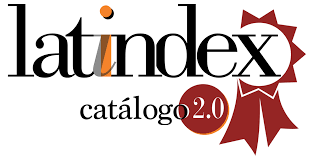

This work is licensed under a Creative Commons Attribution-NonCommercial 4.0 International License.
Revista de Arquitectura is an open access journal. More information...
Authors retain copyright and grant to the Revista de Arquitectura the right of first publication, which will be simultaneously subject to the Creative Commons (CC) BY-NC license.
Authors will sign a non-exclusive distribution license for the published version of the article by completing (RevArq FP03 Permission to Reproduce).
Self-archiving will comply with SHERPA/RoMEO guidelines and the Green classification.
To see in detail these guidelines, please consult...
Abstract
In the search for better didactic strategies in the teaching-learning process of the architecture student, the application of project research, as a didactic strategy, positively influenced the project of the Architectural Design Workshop of the 10th semester 2017-1 at the Universidad Nacional del Centro del Perú, achieved through explanatory, quasi-experimental research. Methods of experimental planning were employed, and for the evaluation of learning by competencies, the analytical rubric was used. The corresponding analysis was made through inferential statistics of the medians of two paired populations, before and after, using the Wilcoxon non-parametric hypothesis test. The results indicate that prior knowledge on project research was not consistent in unit 1 (entry and adaptation stage), while in the follow-up and ending stage there are significant positive differences in the evaluation of units 1 and 3, and 2 and 3. The above shows that the application of project research has been set in the procedures of the Architectural Design Workshop, and it can be concluded that the application of project research, as a didactic strategy, properly exercised, is a relevant part in the teaching-learning process of the architecture student.

References
AboWardah, E. S. (2019). Bridging the gap between research and schematic design phases in teaching architectural graduation projects. Frontiers of Architectural Research, 9(1), 82-105. https://doi.org/10.1016/j.foar.2019.04.005
Alexander, C. (1976). Ensayo sobre la síntesis de la forma (4a). Ediciones Infinito.
Bhooshan, S. (2017). Parametric design thinking: A case-study of practice-embedded architectural research. Design Studies, 52, 115-143. https://doi.org/10.1016/j.destud.2017.05.003
Deming, W. (1989). Calidad, productividad y competividad (versión es). Ed. Díaz de Santos.
Fernández, R. (2013). Inteligencia proyectual, un manual de investigación en arquitectura. Editorial Teseo.
Ferreiro, R. (2007). Estrategias didácticas del aprendizaje cooperativo, el constructivismo social: una nueva forma de enseñar y aprender. Ed. Trillas.
Ghonim, M. y Eweda, N. (2019). Instructors׳ perspectives on the pedagogy of architectural graduation projects: A qualitative study. Frontiers of Architectural Research 8(3), 415-427. https://doi.org/10.1016/j.foar.2019.01.007
Hernández, R., Fernández, C. y Baptista, M. del P. (2014). Metodología de la invetigación (6a). McGraw-Hill /Interamericana Editores, S. A.
Hernández, R. y Mendoza, P. (2018). Metodología de la investigación. McGraw-Hill Education.
Jiménez Correa, S. (2003). Investigación y proyecto arquitectónico. Revista Guillermo de Ockham 1(2), 13-40. https://revistas.usb.edu.co/index.php/GuillermoOckham/article/view/435
Jiménez, S. (2006). El proyecto arquitectónico, aprender investigando. Universidad de San Buenaventura Cali.
Khodeir, L. M. (2018). Blended learning methods as an approach to teaching project management to architecture students. Alexandria Engineering Journal 57(4), 3899-3905. https://doi.org/10.1016/j.aej.2018.10.004
Le Corbusier, J. (1959). Mensaje a los estudiantes de arquitectura. En Biblioteca de arquitectura (Décima, Vol. 6). Ediciones Infinito.
Ludeña, W. (1997). Ideas y arquitectura en el Perú del siglo XX. Servicios Editoriales Múltiples S. A.
Martínez Osorio , P. A. (2013). El proyecto arquitectónico como un problema de investigación. Revista de Arquitectura (Bogotá), 15(1), 54-61. https://doi.org/10.14718/RevArq.2013.15.1.6
Mezarina, C., Moya, N., Portillo, O., Cárdenas, J. y Suasnabar, L. (2016). Modelo educativo - UNCP. Universidad Nacional del Centro del Perú.
Munari, B. (1990). Diseño y comuncación visual (10a). Gustavo Gili, S.A.
Muñoz, A. (2016). El proyecto de arquitectura, concepto proceso y representacion. Editorial Reverté.
Muntañola, J. (2011). La investigación proyectual a examen: un gran desafio a la arquitectura del siglo XXI. Conferencia inaugural de la trienal de investigación FAU-UCV 2011. Facultad de Arquitectura y Urbanismo
Universidad Central de Venezuela. http://trienal.fau.ucv.ve/documentos/Ensayo_de_postgrado_8.pdf
Pina, R. (2004). El proyecto de arquitectura, el rigor cientifico como instrumento poético. Universidad Politécnica de Madrid.
Purini, F. (1984). La arquitectura didáctica. Colección de Arquitectura.
Quaroni, L. (1980). Proyectar un edificio ocho lecciones de arquitectura. Xarait Libros S. A.
Sarquis, J. (2007). 1 Ficción epistemológica itinerarios del proyecto la investigacion proyectual como forma de conocimiento en arquitectura. Bibliográfika de Voros S. A.
Sarquis, J. (2014). Experiencias pedagógicas creativas. Bibliográfika de Voros S. A.
Sierra, R. (2001). Técnicas de investigación social. Universidad Panamericana.
Tappan, M. (2012). La investigación proyectual: Una propuesta que vincula docencia e investigación. En La investigación en diseño, una visión desde los posgrados en México (pp. 219-243). Universidad Autónoma de Ciudad Juárez.
Villagrán, J. (1988). Teoría de la arquitectura. Litográfica Rendón, S. A.
Vitruvio, M. (2002). Los diez libros de arquitectura (3a edición). Alianza Editorial.
Xue, H. y Desmet, P. M. A. (2019). Researcher introspection for experience-driven design research. Design Studies, 63, 37-64. https://doi.org/10.1016/j.destud.2019.03.001
Zamora, H. (2012). La investigación proyectual en arquitectura. Universidad Central de Venezuela.

































